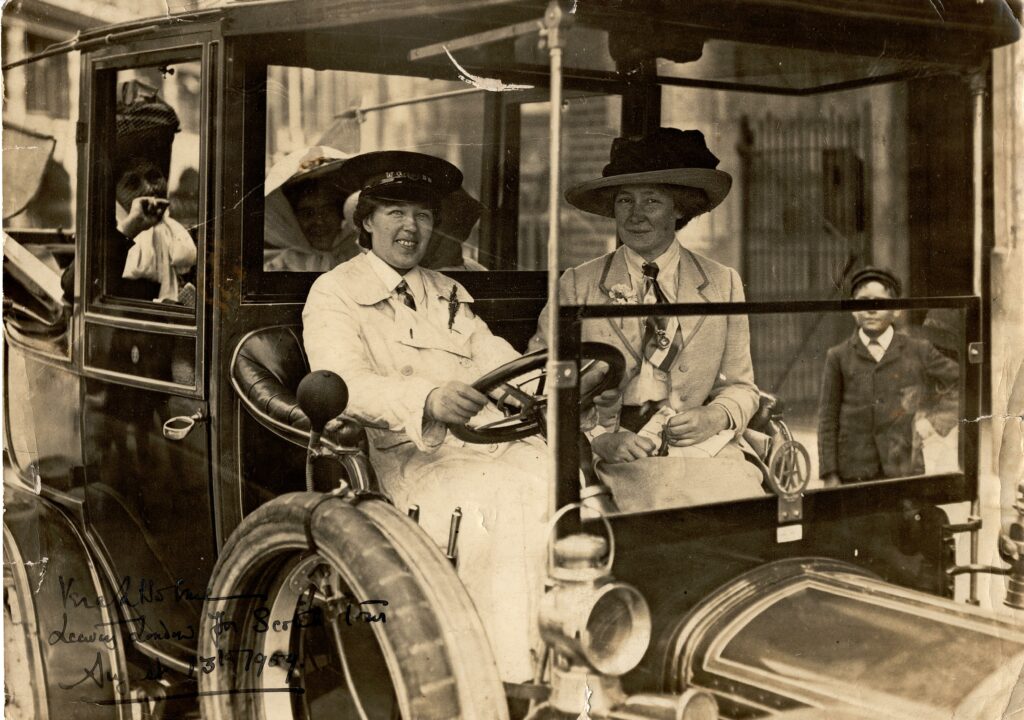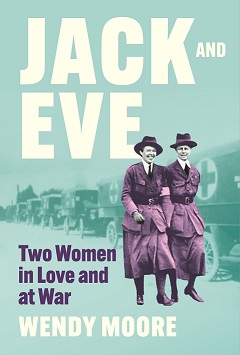Jack and Eve: Two Women in Love and at War, Wendy Moore, Atlantic Books, 2024
Posted on 2nd February, 2024 in Book Review, First World War, Suffragettes, WSPU, Women and War Work
Jack and Eve is an enthralling biography of Vera (Jack) Holme and Evelina Haverfield, the actress and the Hon who met and fell in love during the militant suffrage campaign.
I already knew a fair bit about their suffrage activities. Vera Holme campaigned with Mrs Pankhurst’s Women’s Social and Political Union in Bristol, and she was one of the two suffragettes who famously hid in the organ of the Bristol Beacon (formerly the Colston Hall) to interrupt a Liberal MP’s speech with cries of “votes for women!” Annie Kenney gleefully described how from their hiding place the women watched as the “stewards scampered here, there, and everywhere” looking for them, and “the audience was convulsed at the predicament of the stewards…The hall was in an uproar”. It was a daring and amusing episode (unless you were the politician), and seems to have been typical of Vera, who was known for her high spirits. Both Jack and Eve went to prison for the cause, and Jack, who always wore masculine clothes, served as Mrs Pankhurst’s chauffeur.

Vera (Jack) Holme driving Mrs Pankhurst (seated at back); Edith Craig next to Vera.
Wendy Moore does not, however, dwell on the women’s lives as suffragettes. Most of the book tells the less-well known story of Jack and Eve’s war-time service running hospitals in Serbia. Along the way there are fascinating and insightful discussions of the Edwardian theatre (not forgetting, of course, Vesta Tilley), lesbianism, challenges to rigid gender roles such as Jack’s acquisition of driving and mechanical skills, and Jack’s complicated love life.

Evelina Haverfield (left) and Mrs Pankhurst in the dock
The women’s war years are brought vividly to life. I particularly liked the evocative descriptions of place which transport you to those times and locations: the landscapes, the makeshift hospitals and tents, the appalling roads, the towns and villages. There are some well-drawn portraits of people the women encounter: their colleagues in the medical units, Serbian soldiers, local people. The way Jack and Eve interacted with their colleagues is also well done: there are disputes as well as friendships, tensions as well as camaraderie. Moore uses the war time letters and diaries of Jack and other women to great effect to illuminate these relationships.
Jack and Eve had some truly astonishing experiences as they worked with the men brought back from the battle fields, coped with shortages, undertook perilous journeys, were held prisoner, escaped, smuggled documents through Revolutionary Russia. The writing is powerful and moving without being a catalogue of horrors (though there were horrors aplenty, as there always are in that arch horror, war). In fact, some of the most touching scenes involve small, homely actions such as the way in which, even “in the midst of war”, Jack and Eve tried to recreate a sense of the cosy evenings they had spent in their cottage back home by hanging blankets at the windows of their bleak quarters and gathering around the stove to read to one another; or Jack pinning a flower to Eve’s coat; or Eve sitting with Jack on Christmas Day when she was ill in bed and trying “to tempt her with appetizing titbits”.
Perhaps it’s these fleeting, personal moments that make Jack and Eve feel so present as you read. At the same time, the biography is a real eye-opener to the realities of many women’s war time experiences. But it is always their book. “Theirs was a remarkable story,” writes Moore, “a glorious adventure from their first meeting till their last embrace.” Wendy Moore has certainly done it justice in Jack and Eve.

Jack and Eve is available for pre order at Amazon.
I read an uncorrected proof provided by the publisher, Atlantic Books.
Find out more about Wendy Moore and her books on her website.
Picture Credits:-
Vera ‘Jack’ Holme driving Emmeline Pankhurst (sitting in the back) and others to Scotland, 1909; Evelina Haverfield and Emmeline Pankhurst in court, c. 1909: Women’s Library on Flickr, No Known Copyright Restrictions
